Research Skills 2 Assignment: Bandura's Social Cognitive Theory
VerifiedAdded on 2022/12/27
|7
|2042
|42
Essay
AI Summary
This essay, prepared for the Research Skills 2 module, provides an in-depth analysis of Albert Bandura's Social Cognitive Theory (SCT). The essay explores the intricate interplay of personal, environmental, and behavioral factors, as outlined by Bandura, and their influence on human behavior and decision-making. The assignment uses a case study to illustrate how these factors manifest in real-world scenarios, such as healthcare decisions related to hospital restructuring and emergency service provisions. The essay highlights how personal beliefs, environmental contexts, and behavioral responses impact outcomes, with references to specific examples within the case study. The essay also discusses the significance of these factors in creating an environment conducive to positive outcomes, particularly within the context of healthcare management and staff motivation. The conclusion emphasizes the importance of understanding and considering these various factors to ensure effective decision-making and achieving desired goals.
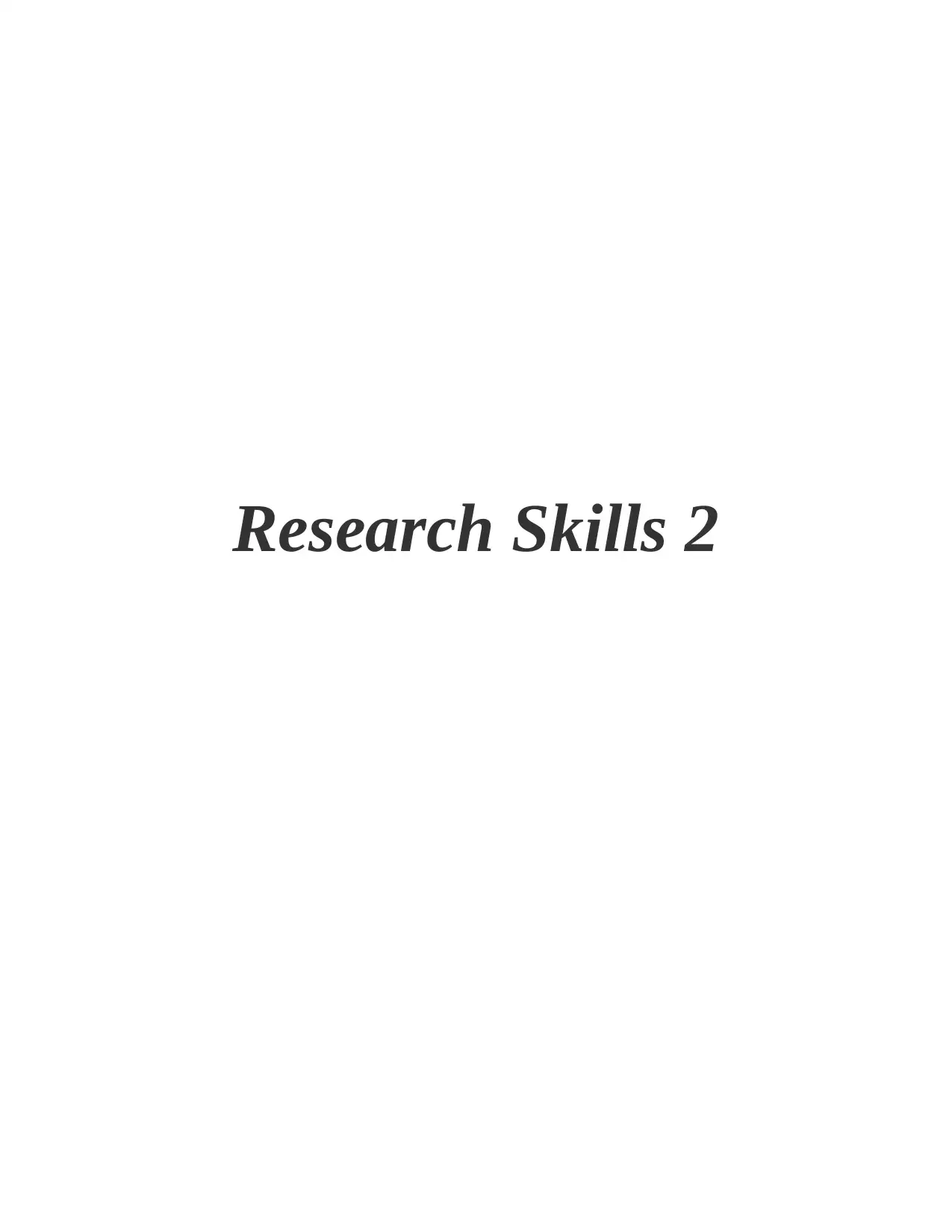
Research Skills 2
Paraphrase This Document
Need a fresh take? Get an instant paraphrase of this document with our AI Paraphraser
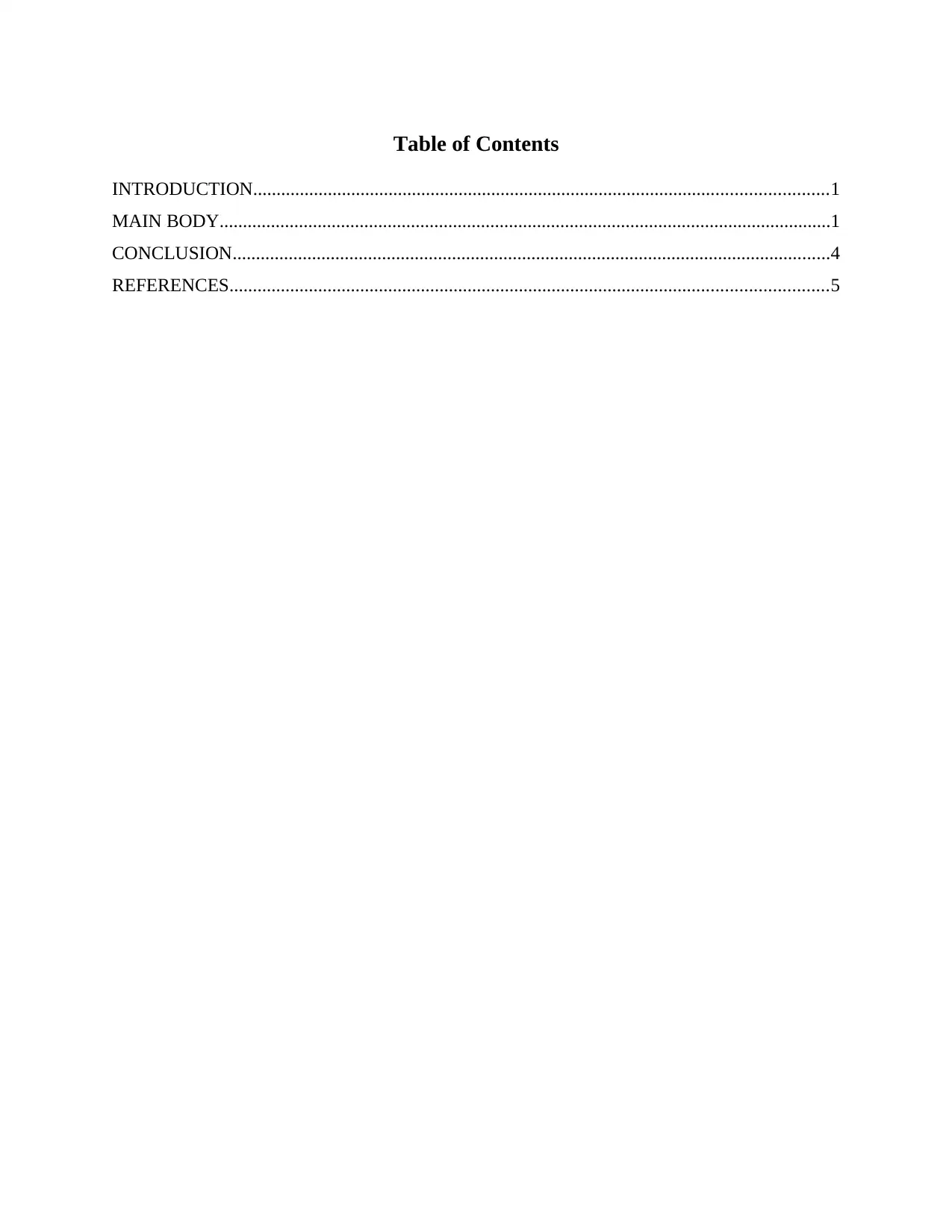
Table of Contents
INTRODUCTION...........................................................................................................................1
MAIN BODY...................................................................................................................................1
CONCLUSION................................................................................................................................4
REFERENCES................................................................................................................................5
INTRODUCTION...........................................................................................................................1
MAIN BODY...................................................................................................................................1
CONCLUSION................................................................................................................................4
REFERENCES................................................................................................................................5
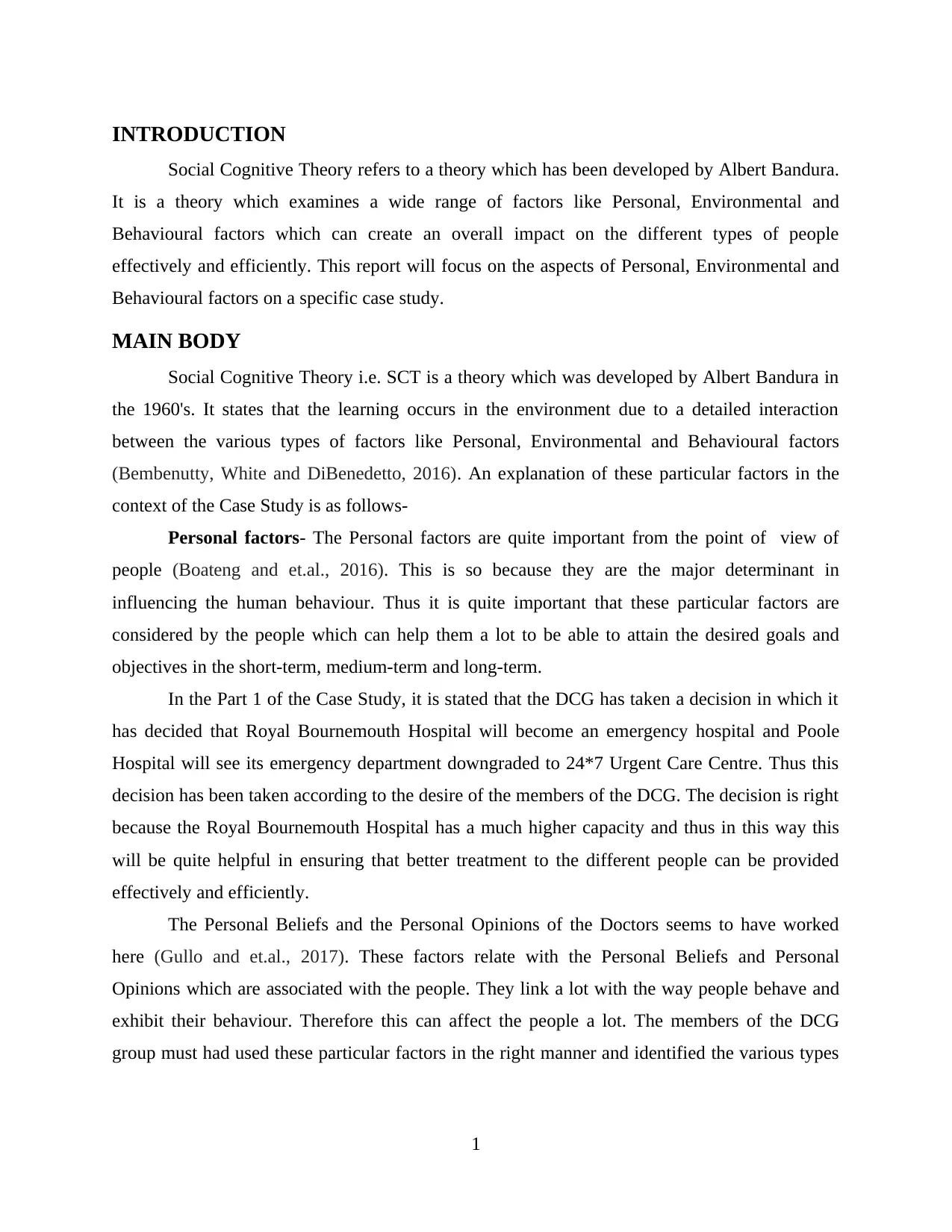
INTRODUCTION
Social Cognitive Theory refers to a theory which has been developed by Albert Bandura.
It is a theory which examines a wide range of factors like Personal, Environmental and
Behavioural factors which can create an overall impact on the different types of people
effectively and efficiently. This report will focus on the aspects of Personal, Environmental and
Behavioural factors on a specific case study.
MAIN BODY
Social Cognitive Theory i.e. SCT is a theory which was developed by Albert Bandura in
the 1960's. It states that the learning occurs in the environment due to a detailed interaction
between the various types of factors like Personal, Environmental and Behavioural factors
(Bembenutty, White and DiBenedetto, 2016). An explanation of these particular factors in the
context of the Case Study is as follows-
Personal factors- The Personal factors are quite important from the point of view of
people (Boateng and et.al., 2016). This is so because they are the major determinant in
influencing the human behaviour. Thus it is quite important that these particular factors are
considered by the people which can help them a lot to be able to attain the desired goals and
objectives in the short-term, medium-term and long-term.
In the Part 1 of the Case Study, it is stated that the DCG has taken a decision in which it
has decided that Royal Bournemouth Hospital will become an emergency hospital and Poole
Hospital will see its emergency department downgraded to 24*7 Urgent Care Centre. Thus this
decision has been taken according to the desire of the members of the DCG. The decision is right
because the Royal Bournemouth Hospital has a much higher capacity and thus in this way this
will be quite helpful in ensuring that better treatment to the different people can be provided
effectively and efficiently.
The Personal Beliefs and the Personal Opinions of the Doctors seems to have worked
here (Gullo and et.al., 2017). These factors relate with the Personal Beliefs and Personal
Opinions which are associated with the people. They link a lot with the way people behave and
exhibit their behaviour. Therefore this can affect the people a lot. The members of the DCG
group must had used these particular factors in the right manner and identified the various types
1
Social Cognitive Theory refers to a theory which has been developed by Albert Bandura.
It is a theory which examines a wide range of factors like Personal, Environmental and
Behavioural factors which can create an overall impact on the different types of people
effectively and efficiently. This report will focus on the aspects of Personal, Environmental and
Behavioural factors on a specific case study.
MAIN BODY
Social Cognitive Theory i.e. SCT is a theory which was developed by Albert Bandura in
the 1960's. It states that the learning occurs in the environment due to a detailed interaction
between the various types of factors like Personal, Environmental and Behavioural factors
(Bembenutty, White and DiBenedetto, 2016). An explanation of these particular factors in the
context of the Case Study is as follows-
Personal factors- The Personal factors are quite important from the point of view of
people (Boateng and et.al., 2016). This is so because they are the major determinant in
influencing the human behaviour. Thus it is quite important that these particular factors are
considered by the people which can help them a lot to be able to attain the desired goals and
objectives in the short-term, medium-term and long-term.
In the Part 1 of the Case Study, it is stated that the DCG has taken a decision in which it
has decided that Royal Bournemouth Hospital will become an emergency hospital and Poole
Hospital will see its emergency department downgraded to 24*7 Urgent Care Centre. Thus this
decision has been taken according to the desire of the members of the DCG. The decision is right
because the Royal Bournemouth Hospital has a much higher capacity and thus in this way this
will be quite helpful in ensuring that better treatment to the different people can be provided
effectively and efficiently.
The Personal Beliefs and the Personal Opinions of the Doctors seems to have worked
here (Gullo and et.al., 2017). These factors relate with the Personal Beliefs and Personal
Opinions which are associated with the people. They link a lot with the way people behave and
exhibit their behaviour. Therefore this can affect the people a lot. The members of the DCG
group must had used these particular factors in the right manner and identified the various types
1
⊘ This is a preview!⊘
Do you want full access?
Subscribe today to unlock all pages.

Trusted by 1+ million students worldwide
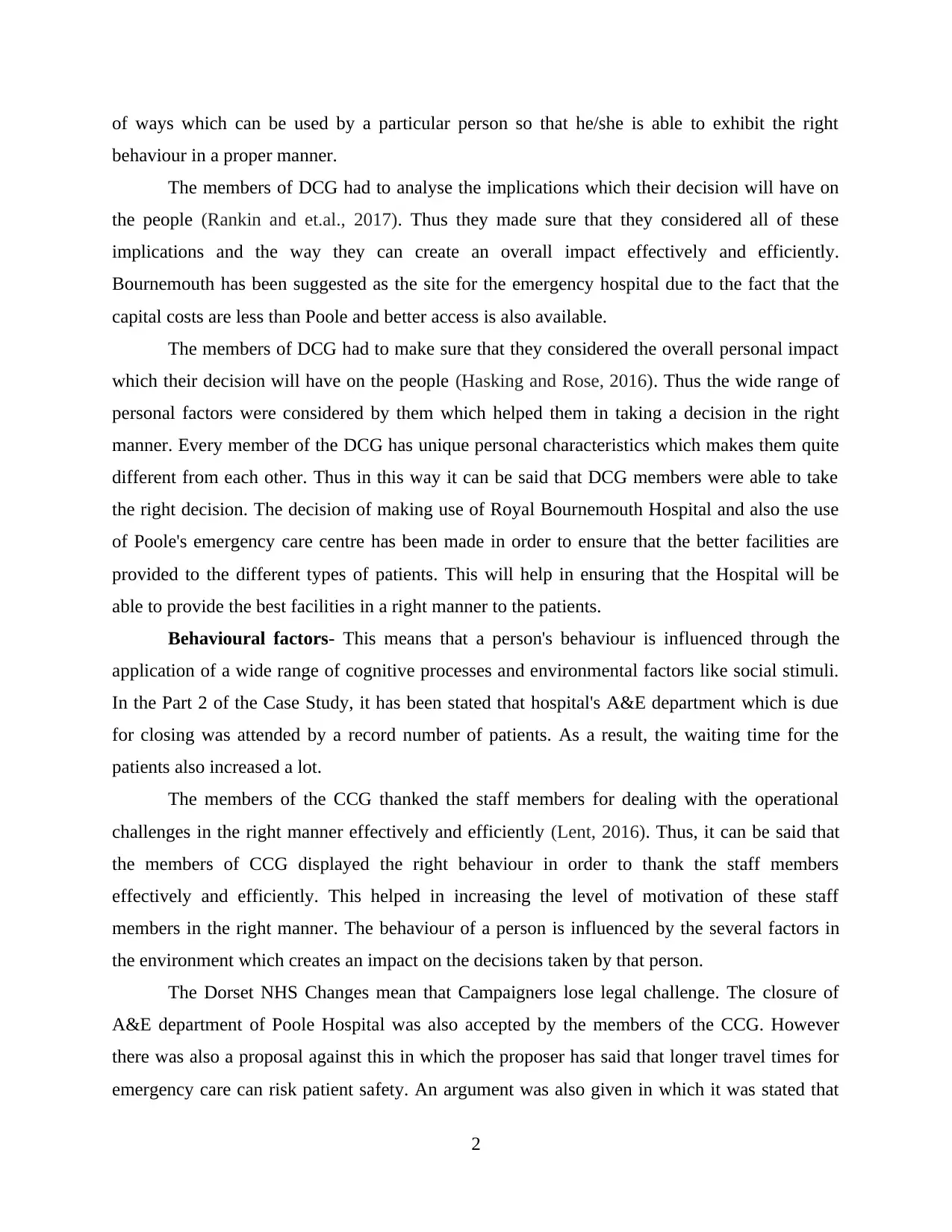
of ways which can be used by a particular person so that he/she is able to exhibit the right
behaviour in a proper manner.
The members of DCG had to analyse the implications which their decision will have on
the people (Rankin and et.al., 2017). Thus they made sure that they considered all of these
implications and the way they can create an overall impact effectively and efficiently.
Bournemouth has been suggested as the site for the emergency hospital due to the fact that the
capital costs are less than Poole and better access is also available.
The members of DCG had to make sure that they considered the overall personal impact
which their decision will have on the people (Hasking and Rose, 2016). Thus the wide range of
personal factors were considered by them which helped them in taking a decision in the right
manner. Every member of the DCG has unique personal characteristics which makes them quite
different from each other. Thus in this way it can be said that DCG members were able to take
the right decision. The decision of making use of Royal Bournemouth Hospital and also the use
of Poole's emergency care centre has been made in order to ensure that the better facilities are
provided to the different types of patients. This will help in ensuring that the Hospital will be
able to provide the best facilities in a right manner to the patients.
Behavioural factors- This means that a person's behaviour is influenced through the
application of a wide range of cognitive processes and environmental factors like social stimuli.
In the Part 2 of the Case Study, it has been stated that hospital's A&E department which is due
for closing was attended by a record number of patients. As a result, the waiting time for the
patients also increased a lot.
The members of the CCG thanked the staff members for dealing with the operational
challenges in the right manner effectively and efficiently (Lent, 2016). Thus, it can be said that
the members of CCG displayed the right behaviour in order to thank the staff members
effectively and efficiently. This helped in increasing the level of motivation of these staff
members in the right manner. The behaviour of a person is influenced by the several factors in
the environment which creates an impact on the decisions taken by that person.
The Dorset NHS Changes mean that Campaigners lose legal challenge. The closure of
A&E department of Poole Hospital was also accepted by the members of the CCG. However
there was also a proposal against this in which the proposer has said that longer travel times for
emergency care can risk patient safety. An argument was also given in which it was stated that
2
behaviour in a proper manner.
The members of DCG had to analyse the implications which their decision will have on
the people (Rankin and et.al., 2017). Thus they made sure that they considered all of these
implications and the way they can create an overall impact effectively and efficiently.
Bournemouth has been suggested as the site for the emergency hospital due to the fact that the
capital costs are less than Poole and better access is also available.
The members of DCG had to make sure that they considered the overall personal impact
which their decision will have on the people (Hasking and Rose, 2016). Thus the wide range of
personal factors were considered by them which helped them in taking a decision in the right
manner. Every member of the DCG has unique personal characteristics which makes them quite
different from each other. Thus in this way it can be said that DCG members were able to take
the right decision. The decision of making use of Royal Bournemouth Hospital and also the use
of Poole's emergency care centre has been made in order to ensure that the better facilities are
provided to the different types of patients. This will help in ensuring that the Hospital will be
able to provide the best facilities in a right manner to the patients.
Behavioural factors- This means that a person's behaviour is influenced through the
application of a wide range of cognitive processes and environmental factors like social stimuli.
In the Part 2 of the Case Study, it has been stated that hospital's A&E department which is due
for closing was attended by a record number of patients. As a result, the waiting time for the
patients also increased a lot.
The members of the CCG thanked the staff members for dealing with the operational
challenges in the right manner effectively and efficiently (Lent, 2016). Thus, it can be said that
the members of CCG displayed the right behaviour in order to thank the staff members
effectively and efficiently. This helped in increasing the level of motivation of these staff
members in the right manner. The behaviour of a person is influenced by the several factors in
the environment which creates an impact on the decisions taken by that person.
The Dorset NHS Changes mean that Campaigners lose legal challenge. The closure of
A&E department of Poole Hospital was also accepted by the members of the CCG. However
there was also a proposal against this in which the proposer has said that longer travel times for
emergency care can risk patient safety. An argument was also given in which it was stated that
2
Paraphrase This Document
Need a fresh take? Get an instant paraphrase of this document with our AI Paraphraser
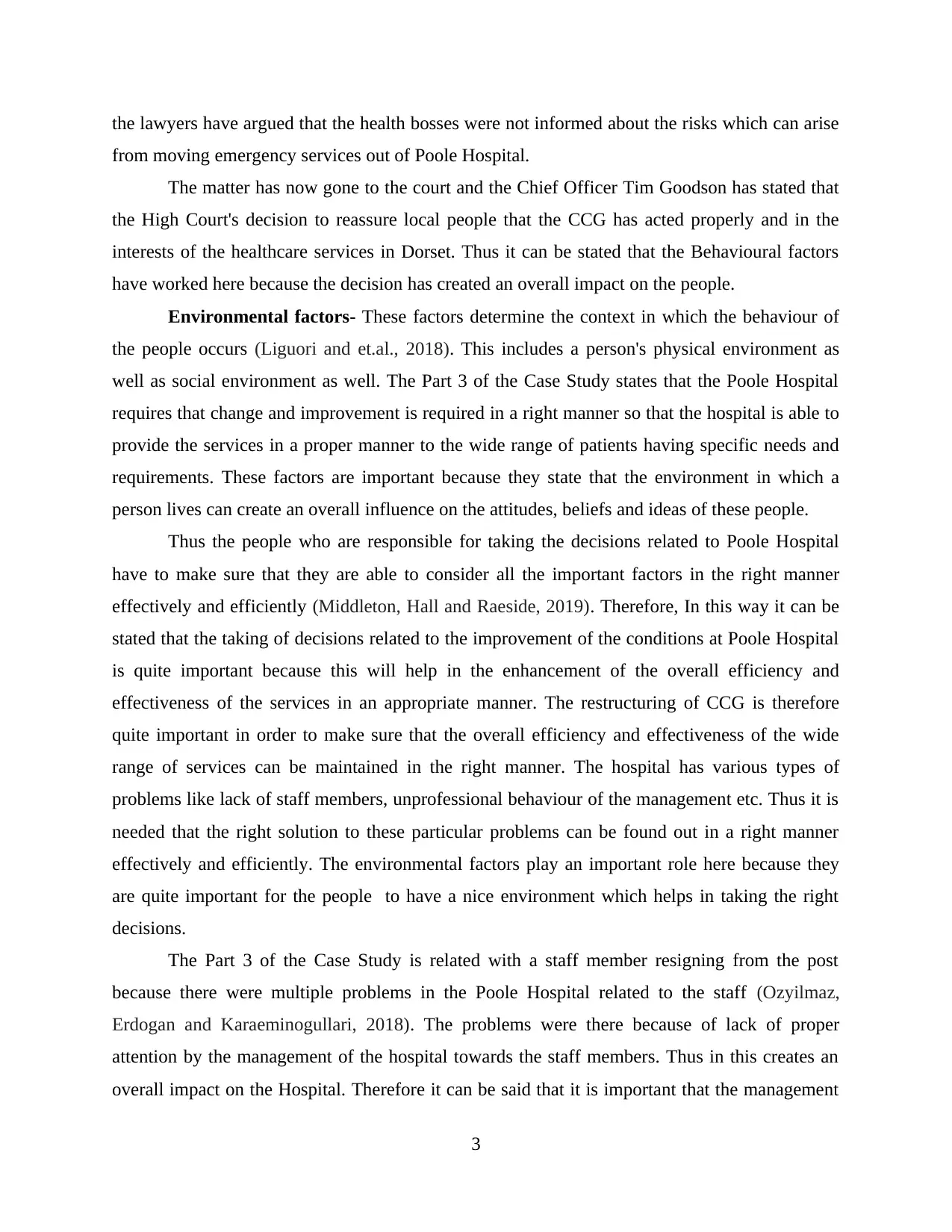
the lawyers have argued that the health bosses were not informed about the risks which can arise
from moving emergency services out of Poole Hospital.
The matter has now gone to the court and the Chief Officer Tim Goodson has stated that
the High Court's decision to reassure local people that the CCG has acted properly and in the
interests of the healthcare services in Dorset. Thus it can be stated that the Behavioural factors
have worked here because the decision has created an overall impact on the people.
Environmental factors- These factors determine the context in which the behaviour of
the people occurs (Liguori and et.al., 2018). This includes a person's physical environment as
well as social environment as well. The Part 3 of the Case Study states that the Poole Hospital
requires that change and improvement is required in a right manner so that the hospital is able to
provide the services in a proper manner to the wide range of patients having specific needs and
requirements. These factors are important because they state that the environment in which a
person lives can create an overall influence on the attitudes, beliefs and ideas of these people.
Thus the people who are responsible for taking the decisions related to Poole Hospital
have to make sure that they are able to consider all the important factors in the right manner
effectively and efficiently (Middleton, Hall and Raeside, 2019). Therefore, In this way it can be
stated that the taking of decisions related to the improvement of the conditions at Poole Hospital
is quite important because this will help in the enhancement of the overall efficiency and
effectiveness of the services in an appropriate manner. The restructuring of CCG is therefore
quite important in order to make sure that the overall efficiency and effectiveness of the wide
range of services can be maintained in the right manner. The hospital has various types of
problems like lack of staff members, unprofessional behaviour of the management etc. Thus it is
needed that the right solution to these particular problems can be found out in a right manner
effectively and efficiently. The environmental factors play an important role here because they
are quite important for the people to have a nice environment which helps in taking the right
decisions.
The Part 3 of the Case Study is related with a staff member resigning from the post
because there were multiple problems in the Poole Hospital related to the staff (Ozyilmaz,
Erdogan and Karaeminogullari, 2018). The problems were there because of lack of proper
attention by the management of the hospital towards the staff members. Thus in this creates an
overall impact on the Hospital. Therefore it can be said that it is important that the management
3
from moving emergency services out of Poole Hospital.
The matter has now gone to the court and the Chief Officer Tim Goodson has stated that
the High Court's decision to reassure local people that the CCG has acted properly and in the
interests of the healthcare services in Dorset. Thus it can be stated that the Behavioural factors
have worked here because the decision has created an overall impact on the people.
Environmental factors- These factors determine the context in which the behaviour of
the people occurs (Liguori and et.al., 2018). This includes a person's physical environment as
well as social environment as well. The Part 3 of the Case Study states that the Poole Hospital
requires that change and improvement is required in a right manner so that the hospital is able to
provide the services in a proper manner to the wide range of patients having specific needs and
requirements. These factors are important because they state that the environment in which a
person lives can create an overall influence on the attitudes, beliefs and ideas of these people.
Thus the people who are responsible for taking the decisions related to Poole Hospital
have to make sure that they are able to consider all the important factors in the right manner
effectively and efficiently (Middleton, Hall and Raeside, 2019). Therefore, In this way it can be
stated that the taking of decisions related to the improvement of the conditions at Poole Hospital
is quite important because this will help in the enhancement of the overall efficiency and
effectiveness of the services in an appropriate manner. The restructuring of CCG is therefore
quite important in order to make sure that the overall efficiency and effectiveness of the wide
range of services can be maintained in the right manner. The hospital has various types of
problems like lack of staff members, unprofessional behaviour of the management etc. Thus it is
needed that the right solution to these particular problems can be found out in a right manner
effectively and efficiently. The environmental factors play an important role here because they
are quite important for the people to have a nice environment which helps in taking the right
decisions.
The Part 3 of the Case Study is related with a staff member resigning from the post
because there were multiple problems in the Poole Hospital related to the staff (Ozyilmaz,
Erdogan and Karaeminogullari, 2018). The problems were there because of lack of proper
attention by the management of the hospital towards the staff members. Thus in this creates an
overall impact on the Hospital. Therefore it can be said that it is important that the management
3
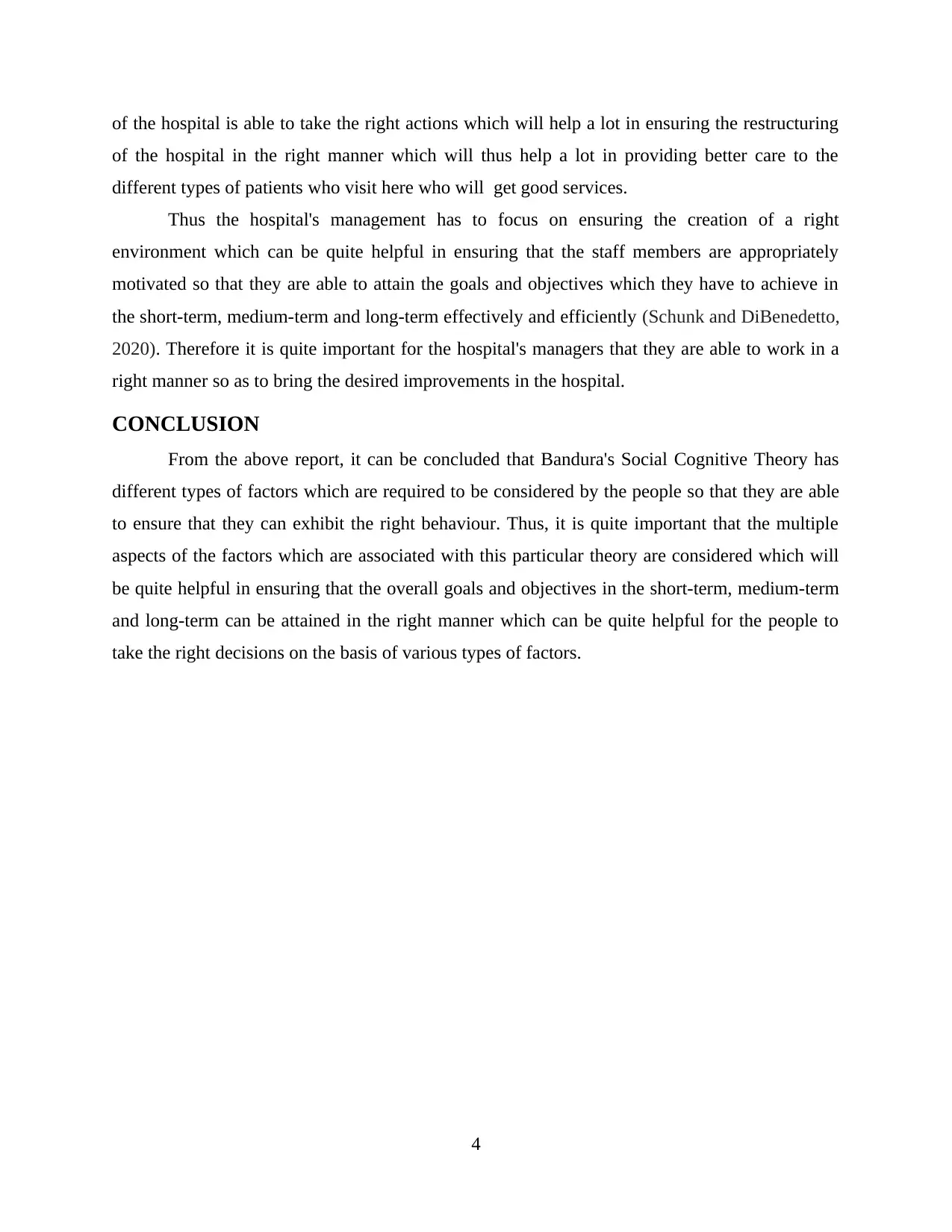
of the hospital is able to take the right actions which will help a lot in ensuring the restructuring
of the hospital in the right manner which will thus help a lot in providing better care to the
different types of patients who visit here who will get good services.
Thus the hospital's management has to focus on ensuring the creation of a right
environment which can be quite helpful in ensuring that the staff members are appropriately
motivated so that they are able to attain the goals and objectives which they have to achieve in
the short-term, medium-term and long-term effectively and efficiently (Schunk and DiBenedetto,
2020). Therefore it is quite important for the hospital's managers that they are able to work in a
right manner so as to bring the desired improvements in the hospital.
CONCLUSION
From the above report, it can be concluded that Bandura's Social Cognitive Theory has
different types of factors which are required to be considered by the people so that they are able
to ensure that they can exhibit the right behaviour. Thus, it is quite important that the multiple
aspects of the factors which are associated with this particular theory are considered which will
be quite helpful in ensuring that the overall goals and objectives in the short-term, medium-term
and long-term can be attained in the right manner which can be quite helpful for the people to
take the right decisions on the basis of various types of factors.
4
of the hospital in the right manner which will thus help a lot in providing better care to the
different types of patients who visit here who will get good services.
Thus the hospital's management has to focus on ensuring the creation of a right
environment which can be quite helpful in ensuring that the staff members are appropriately
motivated so that they are able to attain the goals and objectives which they have to achieve in
the short-term, medium-term and long-term effectively and efficiently (Schunk and DiBenedetto,
2020). Therefore it is quite important for the hospital's managers that they are able to work in a
right manner so as to bring the desired improvements in the hospital.
CONCLUSION
From the above report, it can be concluded that Bandura's Social Cognitive Theory has
different types of factors which are required to be considered by the people so that they are able
to ensure that they can exhibit the right behaviour. Thus, it is quite important that the multiple
aspects of the factors which are associated with this particular theory are considered which will
be quite helpful in ensuring that the overall goals and objectives in the short-term, medium-term
and long-term can be attained in the right manner which can be quite helpful for the people to
take the right decisions on the basis of various types of factors.
4
⊘ This is a preview!⊘
Do you want full access?
Subscribe today to unlock all pages.

Trusted by 1+ million students worldwide
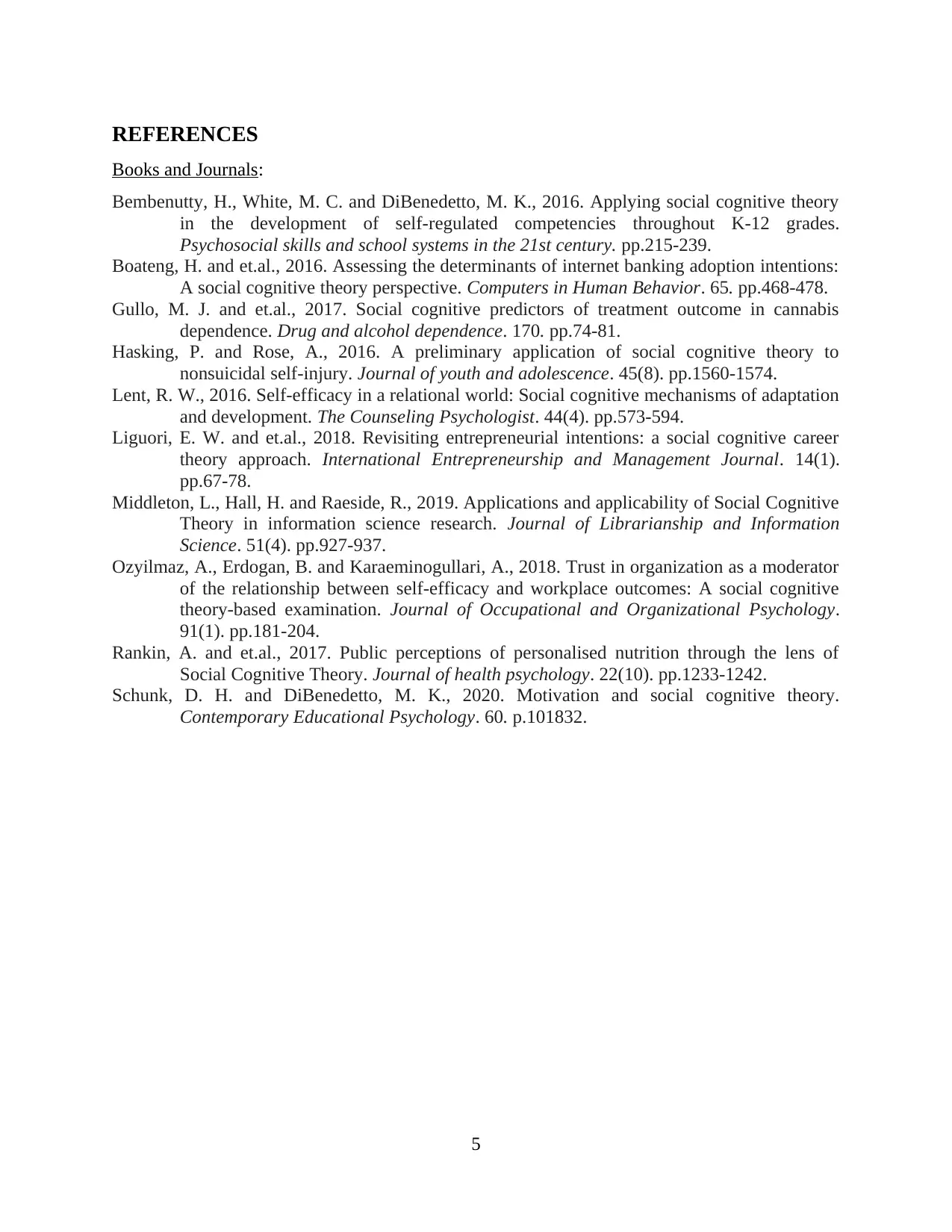
REFERENCES
Books and Journals:
Bembenutty, H., White, M. C. and DiBenedetto, M. K., 2016. Applying social cognitive theory
in the development of self-regulated competencies throughout K-12 grades.
Psychosocial skills and school systems in the 21st century. pp.215-239.
Boateng, H. and et.al., 2016. Assessing the determinants of internet banking adoption intentions:
A social cognitive theory perspective. Computers in Human Behavior. 65. pp.468-478.
Gullo, M. J. and et.al., 2017. Social cognitive predictors of treatment outcome in cannabis
dependence. Drug and alcohol dependence. 170. pp.74-81.
Hasking, P. and Rose, A., 2016. A preliminary application of social cognitive theory to
nonsuicidal self-injury. Journal of youth and adolescence. 45(8). pp.1560-1574.
Lent, R. W., 2016. Self-efficacy in a relational world: Social cognitive mechanisms of adaptation
and development. The Counseling Psychologist. 44(4). pp.573-594.
Liguori, E. W. and et.al., 2018. Revisiting entrepreneurial intentions: a social cognitive career
theory approach. International Entrepreneurship and Management Journal. 14(1).
pp.67-78.
Middleton, L., Hall, H. and Raeside, R., 2019. Applications and applicability of Social Cognitive
Theory in information science research. Journal of Librarianship and Information
Science. 51(4). pp.927-937.
Ozyilmaz, A., Erdogan, B. and Karaeminogullari, A., 2018. Trust in organization as a moderator
of the relationship between self‐efficacy and workplace outcomes: A social cognitive
theory‐based examination. Journal of Occupational and Organizational Psychology.
91(1). pp.181-204.
Rankin, A. and et.al., 2017. Public perceptions of personalised nutrition through the lens of
Social Cognitive Theory. Journal of health psychology. 22(10). pp.1233-1242.
Schunk, D. H. and DiBenedetto, M. K., 2020. Motivation and social cognitive theory.
Contemporary Educational Psychology. 60. p.101832.
5
Books and Journals:
Bembenutty, H., White, M. C. and DiBenedetto, M. K., 2016. Applying social cognitive theory
in the development of self-regulated competencies throughout K-12 grades.
Psychosocial skills and school systems in the 21st century. pp.215-239.
Boateng, H. and et.al., 2016. Assessing the determinants of internet banking adoption intentions:
A social cognitive theory perspective. Computers in Human Behavior. 65. pp.468-478.
Gullo, M. J. and et.al., 2017. Social cognitive predictors of treatment outcome in cannabis
dependence. Drug and alcohol dependence. 170. pp.74-81.
Hasking, P. and Rose, A., 2016. A preliminary application of social cognitive theory to
nonsuicidal self-injury. Journal of youth and adolescence. 45(8). pp.1560-1574.
Lent, R. W., 2016. Self-efficacy in a relational world: Social cognitive mechanisms of adaptation
and development. The Counseling Psychologist. 44(4). pp.573-594.
Liguori, E. W. and et.al., 2018. Revisiting entrepreneurial intentions: a social cognitive career
theory approach. International Entrepreneurship and Management Journal. 14(1).
pp.67-78.
Middleton, L., Hall, H. and Raeside, R., 2019. Applications and applicability of Social Cognitive
Theory in information science research. Journal of Librarianship and Information
Science. 51(4). pp.927-937.
Ozyilmaz, A., Erdogan, B. and Karaeminogullari, A., 2018. Trust in organization as a moderator
of the relationship between self‐efficacy and workplace outcomes: A social cognitive
theory‐based examination. Journal of Occupational and Organizational Psychology.
91(1). pp.181-204.
Rankin, A. and et.al., 2017. Public perceptions of personalised nutrition through the lens of
Social Cognitive Theory. Journal of health psychology. 22(10). pp.1233-1242.
Schunk, D. H. and DiBenedetto, M. K., 2020. Motivation and social cognitive theory.
Contemporary Educational Psychology. 60. p.101832.
5
1 out of 7
Related Documents
Your All-in-One AI-Powered Toolkit for Academic Success.
+13062052269
info@desklib.com
Available 24*7 on WhatsApp / Email
![[object Object]](/_next/static/media/star-bottom.7253800d.svg)
Unlock your academic potential
Copyright © 2020–2026 A2Z Services. All Rights Reserved. Developed and managed by ZUCOL.




